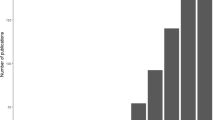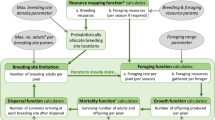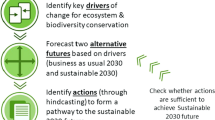Abstract
The social ecological system (SES) framework is used to investigate the success of discard management, by gathering knowledge from worldwide examples of discard management applications. The literature search confirmed that most efforts aiming to reduce discards were implemented under top-down management schemes. For about half of the case studies where management tools were applied, a reduction of discards was achieved. To determine the attributes that influence the discard management success, a probabilistic classifier model (Naive Bayes Classifier) was used. This revealed that commonly used interventions to reduce discards can be ineffective unless advice is given in alternative forms that have societal acceptance. The role of social cohesion and stakeholder enforcement mechanisms is underlined and increases the odds of meeting successfully the recommendations for achieving sustainable fisheries. A successful combination of attributes that can lead to the minimization of discards requires robust social capital along with top-down measures. Overall, the classification algorithm proves the usefulness of the SES framework to describe the fishery response to managerial efforts that aim to reduce discarding. Establishment of links between fishing communities and scientists are the key for enhancing stakeholder engagement, increasing compliance and minimizing discards.



Similar content being viewed by others
References
Alverson DL, Freeberg MH, Murawski SA, Pope JG (1994) A global assessment of fisheries bycatch and discards.FAO fish. Technical paper 339. FAO, Rome
Branch TA, Rutherford K, Hilborn R (2006) Replacing trip limits with individual transferable quotas: implications for discarding. Mar Policy 30(3):281–292
Brier GW (1950) Verification of forecasts expressed in terms of probability. Mon Weather Rev 78(1):1–3
Catchpole TL, Gray TS (2010) Reducing discards of fish at sea: a review of European pilot projects. J Environ Manag 91:717–723
Catchpole TL, Frid CLJ, Gray TS (2005) Discards in North Sea Fisheries: causes, consequences and solutions. Mar Policy 29:421–430
Catchpole TL, Revill AS, Innes J, Pascoe S (2008) Evaluating the efficacy of technical measures: a case study of selection device legislation in the UK Crangon crangon (brown shrimp) fishery. ICES J Mar Sci 65(2):267–275
Christou M, Haralabous J, Stergiou KI, Damalas D, Maravelias CD (2017) An evaluation of socioeconomic factors that influence fishers’ discard behaviour in the Greek bottom trawl fishery. Fish Res 195:105–115
Christou M, Maynou F, Tserpes G, Stergiou KI, Maravelias CD (2019) “Crash Landing” obligation for Mediterranean mixed fisheries: evaluation of management strategies using bioeconomic modelling in the Aegean Sea. Sci Mar 82(3):143–154. https://doi.org/10.3989/scimar.04881.08A
Condie HM, Grant A, Catchpole TL (2014) Incentivising selective fishing under a policy to ban discards; lessons from European and global fisheries. Mar Policy 45:287–292
Damalas D, Maravelias CD, Osio GC, Maynou F, Sbrana M et al (2015) Historical discarding in Mediterranean fisheries: a fishers’ perception. ICES J Mar Sci 72(9):2600–2608
Delgado-Serrano MDM, Ramos PA (2015) Making Ostrom’s framework applicable to characterise social ecological systems at the local level. Int J Commons 9(2):808–830
Depestele J, Feekings J, Reid DJ, Cook R, Gascuel D, Girardin R et al (2019) The impact of fisheries discards on scavengers in the sea. In: Uhlmann S, Ulrich C, Kennelly S (eds) The European landing obligation: reducing discards in complex multi-species and multi-jurisdictional fisheries. Springer, Cambridge
Eliasen S, Papadopoulou N, Vassilopoulou V, Catchpole TL (2014) Socio-economic and institutional incentives influencing fishers’ behaviour in relation to fishing practices and discard. ICES J Mar Sci 71:1298–1307
Epstein G, Vogt JM, Mincey SK, Cox M, Fisher B (2013) Missing ecology: integrating ecological perspectives with the social-ecological system framework. Int J Commons 7(2):432–453
Froese R, Winker H, Corod G, Demirele N, Tsikliras AC et al (2018) Status and rebuilding of European fisheries. Mar Policy 93:159–170
Fulton EA, Smith ADM, Smith DC, van Putten IE (2011) Human behaviour: the key source of uncertainty in fisheries management. Fish Fish 12:2–17. https://doi.org/10.1111/j.1467-2979.2010.00371.x
Gillis DM, Pikitch EK, Peterman RM (1995) Dynamic discarding decisions: foraging theory for high-grading in a trawl fishery. Behav Ecol 6(2):146–154
Graham N, Ferro RST, Karp WA, MacMullen P (2007) Fishing practice, gear design, and the ecosystem approach—three case studies demonstrating the effect of management strategy on gear selectivity and discards. ICES J Mar Sci 64:744–750
Gutiérrez NL, Hilborn R, Defeo O (2011) Leadership, social capital and incentives promote successful fisheries. Nature 470(7334):386
Hall MA, Alverson DL, Metuzals KI (2000) By-catch: problems and solutions. Mar Pollut Bull 41:204–219
Hilborn R (1985) Fleet dynamics and individual variation: why some people catch more fish than others. Can J Fish Aquat Sci 42(1):2–13
Hilborn R (2007) Moving to sustainability by learning from successful fisheries. Ambio 36:296–303
Jacquet J, Pauly D (2008) Funding priorities: big barriers to small-scale fisheries. Conserv Biol 22(4):832–835
Jennings S, Kaiser MJ (1998) The effects of fishing on marine ecosystems. Adv Mar Biol 34:201–352
Karris G, Ketsilis-Rinis V, Kalogeropoulou A, Xirouchakis S, Machias A, Maina I et al (2018) The use of demersal trawling discards as a food source for two scavenging seabird species: a case study of an eastern Mediterranean oligotrophic marine ecosystem. Avian Res 9:26
Kelleher K (2005) Discards in the world’s marine fisheries: an update (no. 470). Food and Agriculture Org., Rome
Leslie HM, Basurto X, Nenadovic M, Sievanen L, Cavanaug K, Cota-Nieto JJ, Erisman B, Finkbeiner E, Hinojosa-Arango G, Moreno-Baez M, Nagavarup S, Reddy SM, Sanchez-Rodriguez A et al (2015) Operationalizing the social-ecological systems framework to assess sustainability. Proc Natl Acad Sci USA 112(19):5979–5984
Machias A, Vassilopoulou V, Vatsos D, Bekas P, Kallianiotis A et al (2001) Bottom trawl discards in the northeastern Mediterranean Sea. Fish Res 53(2):181–195
Maynou F, Gil MDM, Vitale S, Giusto GB, Foutsi A et al (2018) Fishers’ perceptions of the European Union discards ban: perspective from south European fisheries. Mar Policy 89:147–153
Morandeau G, Macher C, Sanchez F, Bru N, Fauconnet L et al (2014) Why do fishermen discard? Distribution and quantification of the causes of discards in the Southern Bay of Biscay passive gear fisheries. Mar Policy 48:30–38
Nikolic N, Diméet J, Fifas S, Salaün M, Ravard D et al (2015) Efficacy of selective devices in reducing discards in the Nephrops trawl fishery in the Bay of Biscay. ICES J Mar Sci 72(6):1869–1881. https://doi.org/10.1093/icesjms/fsv036
O’Keefe CE, Cadrin SX, Stokesbury KDE (2014) Evaluating effectiveness of time/area closures, quotas/caps, and fleet communications to reduce fisheries bycatch. ICES J Mar Sci 71(5):1286–1297
Ostrom E (2009) A general framework for analyzing sustainability of social–ecological systems. Science 325(5939):419–422
Partelow S (2015) Key steps for operationalizing social–ecological system framework research in small-scale fisheries: a heuristic conceptual approach. Mar Policy 51:507–511
Pérez-Roda MA (ed), Gilman E, Huntington T et al (2019) A third assessment of global marine fisheries discards. FAO fisheries and aquaculture technical paper no. 633. FAO, Rome
R Core Team (2017) R: a language and environment for statistical computing. R Foundation for Statistical Computing, Vienna
Scyphers SB, Picou JS, Grabowski JH (2019) Chronic social disruption following a systemic fishery failure. Proc Natl Acad Sci 116(46):22912–22914
Sutinen JG, Kuperan K (1999) A socio-economic theory of regulatory compliance. Int J Soc Econ 26(1/2/3):174–193
Suuronen P, Sardà F (2007) The role of technical measures in European fisheries management and how to make them work better. ICES J Mar Sci 64(4):751–756
Suuronen P, Tschernij V, Jounela P, Valentinsson D, Larsson PO (2007) Factors affecting rule compliance with mesh size regulations in the Baltic cod trawl fishery. ICES J Mar Sci 64(8):1603–1606
Tsagarakis K, Machias A, Giannoulaki M, Somarakis S, Karakassis I (2008) Seasonal and temporal trends in metrics of fish community for otter-trawl discards in a Mediterranean ecosystem. ICES J Mar Sci 65(4):539–550
Tsagarakis K, Palialexis A, Vassilopoulou V (2014) Mediterranean fishery discards: review of the existing knowledge. ICES J Mar Sci 71(5):1219–1234
Uhlmann SS, van Helmond AT, Stefánsdóttir EK, Sigurðardóttir S, Haralabous J et al (2013) Discarded fish in European waters: general patterns and contrasts. ICES J Mar Sci 71(5):1235–1245
Wade O, Revill AS, Grant A, Sharp M (2009) Reducing the discards of finfish and benthic invertebrates of UK beam trawlers. Fish Res 97(1):140–147
Wei T, Simko V (2017) R package “corrplot”: visualization of a correlation matrix (Version 0.84). Available from https://github.com/taiyun/corrplot. Accessed 15 Dec 2018
Zeller D, Pauly D (2005) Good news, bad news: global fisheries discards are declining, but so are total catches data. Fish Fish 6:156–159
Zeller D, Cashion T, Palomares M, Pauly D (2018) Global marine fisheries discards: a synthesis of reconstructed data. Fish Fish 19:30–39
Zhang H (2004) The optimality of Naive Bayes. In: Proceedings of the 17th international FLAIRS conference. AAAI Press
Acknowledgements
This work is part of the Ph.D. thesis of the first author, conducted at the Aristotle University of Thessaloniki and has received funding from the European Commission’s Horizon 2020 Research and Innovation Program under Grant Agreement No. 634495 (Project Science, Technology, and Society Initiative to minimize Unwanted Catches in European Fisheries- MINOUW). We are very grateful to Ms. Eliza Andreou and Ms. Christina Kyprianou for proofreading the manuscript. The authors are grateful to two anonymous reviewers and the editorial team for providing comments that helped to improve the quality of the manuscript.
Author information
Authors and Affiliations
Corresponding author
Ethics declarations
Conflict of interest
The authors declare that they have no conflict of interest.
Additional information
Publisher's Note
Springer Nature remains neutral with regard to jurisdictional claims in published maps and institutional affiliations.
Electronic supplementary material
Below is the link to the electronic supplementary material.
Rights and permissions
About this article
Cite this article
Christou, M., Sgardeli, V., Tsikliras, A.C. et al. A probabilistic model that determines the social ecological system (SES) attributes that lead to successful discard management. Rev Fish Biol Fisheries 30, 109–119 (2020). https://doi.org/10.1007/s11160-020-09593-0
Received:
Accepted:
Published:
Issue Date:
DOI: https://doi.org/10.1007/s11160-020-09593-0




